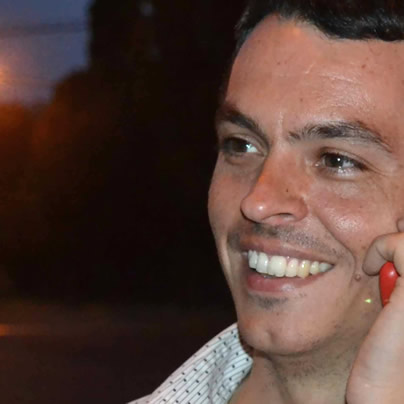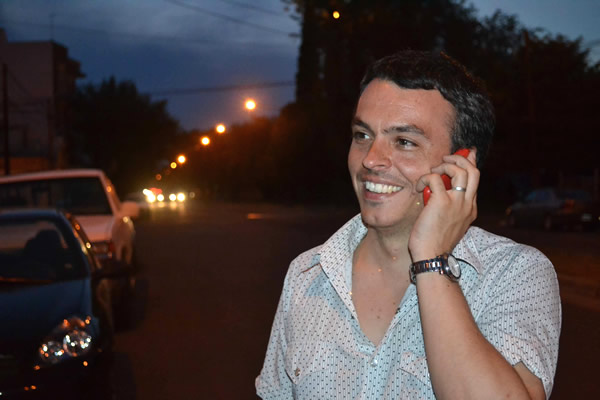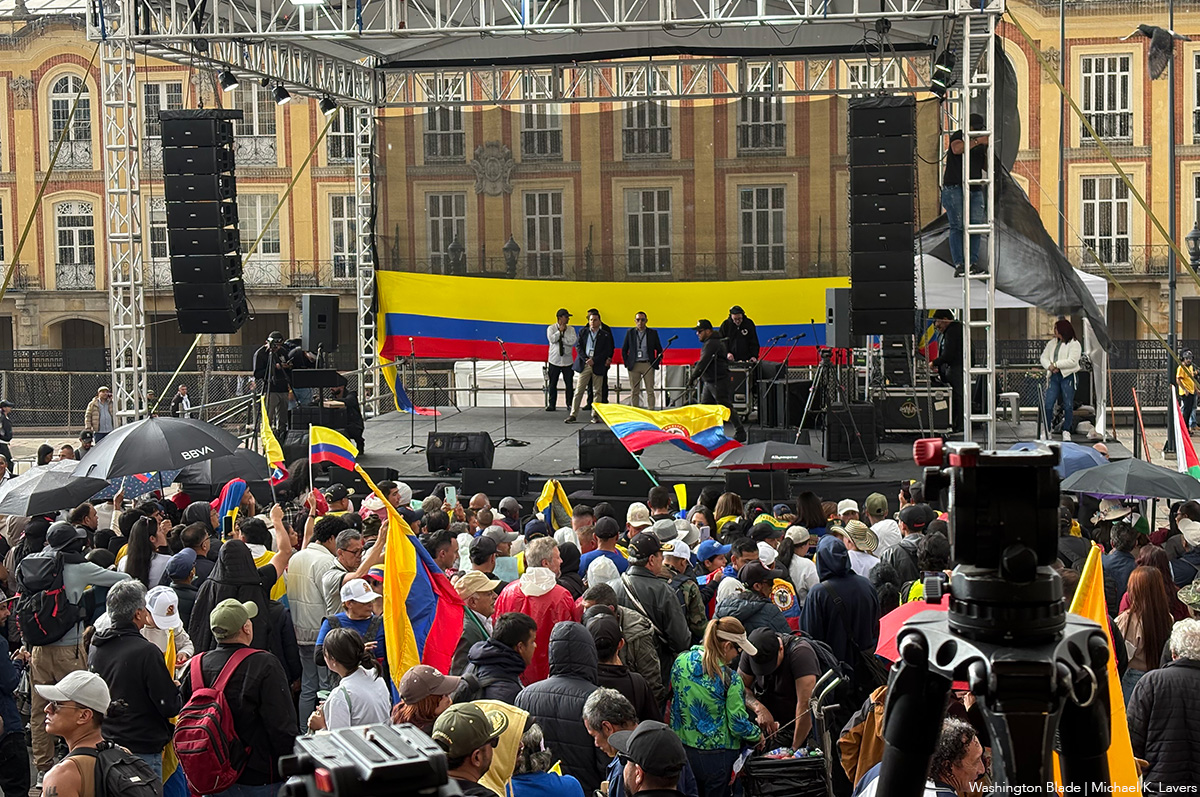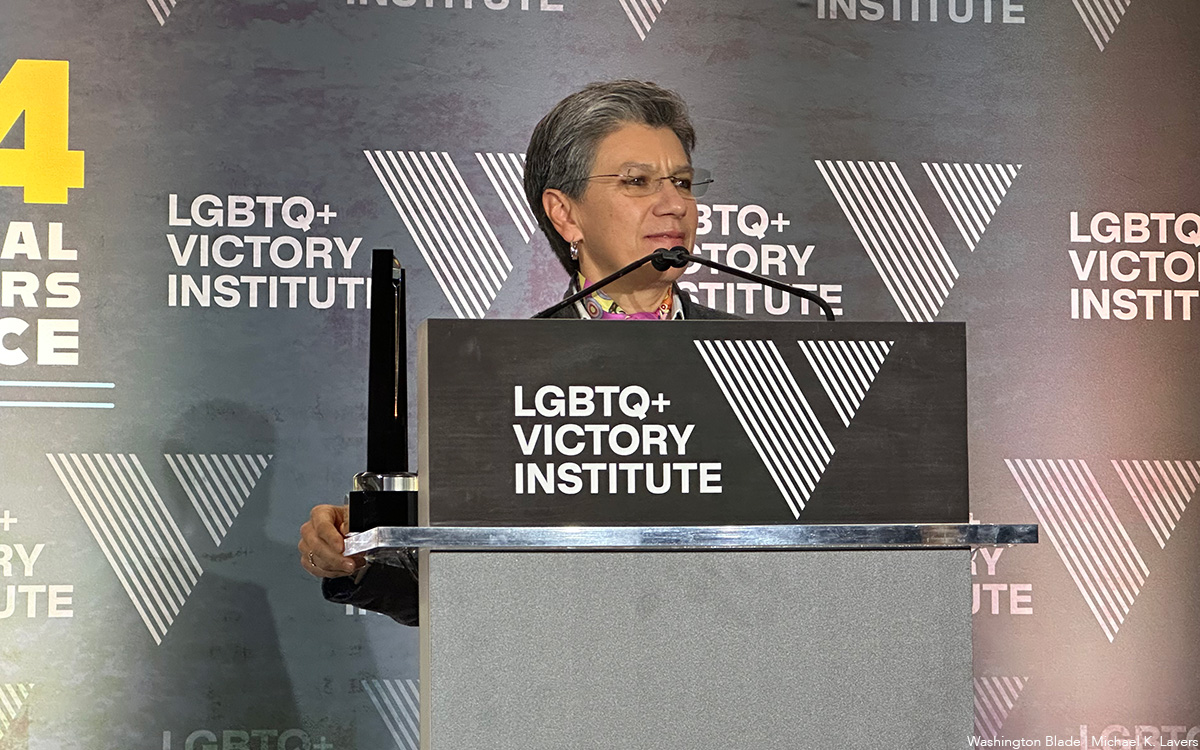World
Argentine gay activist criticizes Pope Francis
Francis led campaign against same-sex marriage in Argentina


Esteban Paulón of the Lesbian, Gay, Bisexual and Trans Federation of Argentina. Photo courtesy of Esteban Paulón.
Argentina’s leading LGBT rights advocate on Wednesday criticized Pope Francis’ strong opposition to marriage rights for same-sex couples.
Esteban Paulón, president of the Lesbian, Gay, Bisexual and Trans Federation (FALGBT,) noted during an interview with the Washington Blade hours after the College of Cardinals elected Francis that he was among the most vocal critics of a same-sex marriage bill that President Cristina Fernández de Kirchner signed in 2010. The new pontiff, who was the-then archbishop of Buenos Aires, described the measure in a letter he wrote to four Argentine monasteries before the country’s Senate approved it as a “machination of the Father of Lies that seeks to confuse and deceive the children of God.”
Francis further categorized the bill as “the work of the devil” that would “spark God’s war.”
“He organized people who mobilized themselves en masse against the equality law and the rights of the collective diversity in moments during which the enormous social and parliamentary consensus that the equality law had in our country was clear,” Paulón said.
Fernández strongly rebuked Francis’ comments.
“It’s worrisome to listen to expressions such as ‘God’s war,’ ‘The work of the Devil;’ things which actually bring us back to the times of the Inquisition, to Medieval Times,” she said while on an official trip to China during the same-sex marriage debate.
The Argentine president further referenced the Crusades as she criticized Francis’ remarks.
“It establishes, as a society, a place which I don’t think any of us wants to have,” Kirchner said. “We are all willing to debate, to discuss, to dissent, but do it within a rational frame without stigmatizing others because they think differently and fundamentally.”
Paulón noted to the Blade that Francis lived in a country in which same-sex marriage has been legal for more than two years.
“This law did not cause any catastrophe, it did not damage the family, it did not cause the destruction of anything,” he said. “It has strengthened families; it has granted rights that have made many people happy.”
Francis, a Jesuit who was previously known as Jorge Mario Bergoglio, was born in Buenos Aires to Italian immigrant parents in 1936.
He became archbishop of the Argentine capital in 1998. Pope John Paul II in 2001 appointed him cardinal.
Francis was also reportedly the runner-up in 2005 when the College of Cardinals elected Benedict XVI to succeed the previous pontiff.
In addition to his opposition to marriage rights for same-sex couples, Paulón noted the new pope also spoke out against Argentina’s law that allows trans people to legally change their gender without sex-reassignment surgery. Francis has also claimed that adoption rights for gays and lesbians in the country constitutes discrimination against children.
The new pontiff has also been outspoken against efforts to allow abortion and in-vitro fertilization in Argentina.
A journalist in 2005 accused Francis of conspiring with the military junta that governed the country from 1976 to 1983 to kidnap two Jesuit priests. Up to an estimated 30,000 Argentines died or disappeared during the so-called dirty war, but Francis in 2010 told a court he actually tried to help the priests and others whom the regime had targeted.
In spite of the controversies, he has reached out to people with HIV/AIDS.
The National Catholic Reporter reported he kissed and washed the feet of 12 AIDS patients at a hospice he visited in 2001. Francis has also defended the poor and the public sector.
“On some issues the church has a discourse of mercy, of piety, of compassion,” Paulón said.
Francis faces criticism from other Latin America activists
Other LGBT rights advocates throughout the region have also criticized Francis, who is the first non-European pope.
“The Vatican and the entire hierarchy of the Catholic church have once again shown indifference at the very least to the human rights of people, electing as their highest representative someone who has stigmatized and offended the love between same-sex couples, calling it a danger to the family, for children and as a move towards the devil,” a spokesperson from the Movement for Homosexual Integration and Liberation, a Chilean LGBT rights group, said in a statement.
Ricardo Montenegro Vásquez, director of Orgullo LGBT Colombia, also spoke out against Francis’ election.
“With his election, the Vatican conclave insists on sowing prejudice and hate against some people who more than simply repudiating, deserve understanding and social inclusion,” he said.
Rev. Victor Bracuto of the Metropolitan Community Church in Buenos Aires, pointed out Francis’ advocacy for the poor and speaking out against corruption. He also highlighted the pontiff’s opposition to Argentina’s same-sex marriage and gender identity laws and his reputed ties to the military junta.
Bracuto described the conclave’s decision to elect Francis as a “strategic political decision” in a statement he e-mailed to the Blade.
“He will be a pope of friendly discourse with the poor, austere and pious, but a cloud will continue to hang over his head over the dictatorship, excluding the GLBTI collective,” he wrote. “He will seek to ensure that the ‘politics of right’ do not spread.”
In spite of her previous statements against the new pope, Fernández congratulated Francis in a statement she issued shortly after the College of Cardinals elected him. She will also attend his installation Mass in Rome on March 19.
“It is our desire that you have, assuming the helm and guidance of the church … successfully carry out your extremely important pastoral charge in pursuit of justice, equality, fraternity and peace for mankind,” Kirchner said.
Paulón acknowledged many of his countrymen feel a sense of pride over Francis’ election.
More than 75 percent of Argentines are Catholic, but Paulón concedes he does not feel the church’s opposition to same-sex marriage and other issues will change under Francis’ pontificate.
“We would like to be optimistic but we do not have much reason to be so,” he said.
Colombia
Colombians protest against Trump after he threatened country’s president
Tens of thousands protested the US president in Bogotá

BOGOTÁ, Colombia — Tens of thousands of people on Wednesday gathered in the Colombian capital to protest against President Donald Trump after he threatened Colombian President Gustavo Petro.
The protesters who gathered in Plaza Bolívar in Bogotá held signs that read, among other things, “Yankees go home” and “Petro is not alone.” Petro is among those who spoke.
The Bogotá protest took place four days after American forces seized now former Venezuelan President Nicolás Maduro and his wife, Cilia Flores, at their home in Caracas, the Venezuelan capital, during an overnight operation.
The Venezuelan National Assembly on Sunday swore in Delcy Rodríguez, who was Maduro’s vice president, as the country’s acting president. Maduro and Flores on Monday pleaded not guilty to federal drug charges in New York.
Trump on Sunday suggested the U.S. will target Petro, a former Bogotá mayor and senator who was once a member of the M-19 guerrilla movement that disbanded in the 1990s. Claudia López, a former senator who would become the country’s first female and first lesbian president if she wins Colombia’s presidential election that will take place later this year, is among those who criticized Trump’s comments.
The Bogotá protest is among hundreds against Trump that took place across Colombia on Wednesday.
Petro on Wednesday night said he and Trump spoke on the phone. Trump in a Truth Social post confirmed he and his Colombian counterpart had spoken.
“It was a great honor to speak with the president of Colombia, Gustavo Petro, who called to explain the situation of drugs and other disagreements that we have had,” wrote Trump. “I appreciated his call and tone, and look forward to meeting him in the near future. Arrangements are being made between Secretary of State Marco Rubio and the foreign minister of Colombia. The meeting will take place in the White House in Washington, D.C.”

Colombia
Gay Venezuelan man who fled to Colombia uncertain about homeland’s future
Heberth Aguirre left Maracaibo in 2018

BOGOTÁ, Colombia — A gay Venezuelan man who has lived in Colombia since 2018 says he feels uncertain about his homeland’s future after the U.S. seized now former Venezuelan President Nicolás Maduro.
“On one hand I can feel happy, but on the other hand I feel very concerned,” Heberth Aguirre told the Washington Blade on Tuesday during an interview at a shopping mall in Bogotá, the Colombian capital.
Aguirre, 35, is from Maracaibo, Venezuela’s second-largest city that is the heart of the country’s oil industry.
He developed cultural and art initiatives for the Zulia State government.
“Little by little, I suddenly became involved in politics because, in a way, you had to be involved,” recalled Aguirre. “It was necessary to be involved because the regime often said so.”
“I basically felt like I was working for the citizens, but with this deeply ingrained rule we had to be on their side, on the side of the Maduro and (former President Hugo) Chávez regime,” he added.
Maduro in 2013 became Venezuela’s president after Chávez died.
“There are things I don’t support about the regime,” Aguirre told the Blade. “There are other things that were nice in theory, but it turned out that they didn’t work when we put them into practice.”
Aguirre noted the Maduro government implemented “a lot of laws.” He also said he and other LGBTQ Venezuelans didn’t “have any kind of guarantee for our lives in general.”
“That also exposed you in a way,” said Aguirre. “You felt somewhat protected by working with them (the government), but it wasn’t entirely true.”
Aguirre, 35, studied graphic design at the University of Zulia in Maracaibo. He said he eventually withdrew after soldiers, members of Venezuela’s Bolivarian National Guard, and police officers opened fire on students.
“That happened many times, to the point where I said I couldn’t keep risking my life,” Aguirre told the Blade. “It hurt me to see what was happening, and it hurt me to have lost my place at the university.”
Venezuela’s economic crisis and increased insecurity prompted Aguirre to leave the country in 2018. He entered Colombia at the Simón Bolívar Bridge near the city of Cúcuta in the country’s Norte de Santander Province.
“If you thought differently, they (the Venezuelan government) would come after you or make you disappear, and nobody would do anything about it,” said Aguirre in response to the Blade’s question about why he left Venezuela.
The Simón Bolívar Bridge on the Colombia-Venezuela border on May 14, 2019. (Washington Blade video by Michael K. Lavers)
Aguirre spoke with the Blade three days after American forces seized Maduro and his wife, Cilia Flores, at their home in Caracas, the Venezuelan capital, during an overnight operation.
The Venezuelan National Assembly on Sunday swore in Delcy Rodríguez, who was Maduro’s vice president, as the country’s acting president. Maduro and Flores on Monday pleaded not guilty to federal drug charges in New York.
President Donald Trump on Tuesday in a Truth Social post said Venezuela’s interim authorities “will be turning over between 30 and 50 million barrels of high quality, sanctioned oil, to the United States of America.”
“This oil will be sold at its market price, and that money will be controlled by me, as president of the United States of America, to ensure it is used to benefit the people of Venezuela and the United States,” wrote Trump.
Trump on Sunday suggested the U.S. will target Colombian President Gustavo Petro, a former Bogotá mayor and senator who was once a member of the M-19 guerrilla movement that disbanded in the 1990s.
Petro has urged Colombians to take to the streets on Wednesday and “defend national sovereignty.” Claudia López, a former senator who would become the country’s first female and first lesbian president if she wins Colombia’s presidential election that will take place later this year, is among those who criticized Trump’s comments.
“Let’s be clear: Trump doesn’t care about the humanitarian aspect,” said Aguirre when the Blade asked him about Trump. “We can’t portray him as Venezuela’s savior.”
Meanwhile, Aguirre said his relatives in Maracaibo remain afraid of what will happen in the wake of Maduro’s ouster.
“My family is honestly keeping quiet,” he said. “They don’t post anything online. They don’t go out to participate in marches or celebrations.”
“Imagine them being at the epicenter, in the eye of the hurricane,” added Aguirre. “They are right in the middle of all the problems, so it’s perfectly understandable that they don’t want to say anything.”
‘I never in my life thought I would have to emigrate’
Aguirre has built a new life in Bogotá.
He founded Mesa Distrital LGBTIQ+ de Jóvenes y Estudiantes, a group that works with migrants from Venezuela and other countries and internally placed Colombians, during the COVID-19 pandemic. Aguirre told the Blade he launched the group “with the need to contribute to the general population, not just in Colombia.”
Aguirre met his husband, an American from California, at a Bogotá church in December 2020 during a Christmas event that SDA Kinship Colombia, an LGBTQ group, organized. A Utah judge virtually officiated their wedding on July 12, 2024.
“I love Colombia, I love Bogotá,” said Aguirre. “I love everything I’ve experienced because I feel it has helped me grow.”
He once again stressed he does not know what a post-Maduro Venezuela will look like.
“As a Venezuelan, I experienced the wonders of that country,” said Aguirre. “I never in my life thought I would have to emigrate.”
The Colombian government’s Permiso por Protección Temporal program allows Aguirre and other Venezuelans who have sought refuge in Colombia to live in the country for up to 10 years. Aguirre reiterated his love for Colombia, but he told the Blade that he would like to return to Venezuela and help rebuild the country.
“I wish this would be over in five years, that we could return to our country, that we could go back and even return with more skills acquired abroad,” Aguirre told the Blade. “Many of us received training. Many of us studied a lot. We connected with organizations that formed networks, which enriched us as individuals and as professionals.”
“Returning would be wonderful,” he added. “What we’ve built abroad will almost certainly serve to enrich the country.”
Colombia
Claudia López criticizes Trump over threats against Colombian president
Presidential candidate would become country’s first lesbian head of government

BOGOTÁ, Colombia — Colombian presidential candidate Claudia López has criticized President Donald Trump after he suggested the U.S. will target Colombian President Gustavo Petro.
“Colombia is very sick, too, run by a sick man, who likes making cocaine and selling it to the United States, and he’s not going to be doing it very long,” Trump told reporters on Air Force One on Sunday.
Trump made the comments a day after American forces carried out an overnight operation and seized now former Venezuelan President Nicolás Maduro and wife, Cilia Flores, at their home in Caracas, the Venezuelan capital.
Maduro and Flores on Monday pleaded not guilty to federal drug charges in New York.
Petro is a former Bogotá mayor and senator who was once a member of the M-19 guerrilla movement that disbanded in the 1990s. He has urged Colombians to take to the streets and “defend national sovereignty.”
“Colombians are the ones who decide who governs Colombia,” said López on her X account. “President Gustavo Petro won free elections and has a constitutional mandate.”
López did not mention Trump by name in her comment.
The first-round of Colombia’s presidential election will take place on May 31. The country’s 1991 constitution prevents Petro from seeking re-election.
López in 2019 became the first woman and first lesbian elected mayor of Bogotá, the Colombian capital and the country’s largest city. She took office on Jan. 1, 2020, less than a month after she married her wife, Colombian Sen. Angélica Lozano.
“This year we will decide at the polls what direction (the country) is heading and what leadership will advance Colombia,” said López in her X post. “Supporting soft dictatorships and attacking democracies is an absurd and unacceptable political action by the United States towards Colombia, Venezuela, and Latin America.”
Quién gobierna en Colombia lo decidimos los colombianos.
El presidente @petrogustavo ganó unas elecciones libres y tiene un mandato constitucional. Este año decidiremos en las urnas qué rumbo y a cargo de qué liderazgo avanza Colombia.
Sostener dictablandas y atacar democracias… https://t.co/K61G2QUcck— Claudia López Hernández (@ClaudiaLopez) January 5, 2026
López would be Colombia’s first female president if she wins the election. López would also become the third openly lesbian woman elected head of government — Jóhanna Sigurðardóttir was Iceland’s prime minister from 2009-2013 and Ana Brnabić was Serbia’s prime minister from 2017-2024.
The LGBTQ+ Victory Institute in 2024 honored López at its annual International LGBTQ Leaders Conference in D.C. The Washington Blade interviewed her during the gathering.
-

 Sponsored5 days ago
Sponsored5 days agoSafer Ways to Pay for Online Performances and Queer Events
-

 District of Columbia4 days ago
District of Columbia4 days agoTwo pioneering gay journalists to speak at Thursday event
-

 Colombia4 days ago
Colombia4 days agoBlade travels to Colombia after U.S. forces seize Maduro in Venezuela
-

 a&e features4 days ago
a&e features4 days agoQueer highlights of the 2026 Critics Choice Awards: Aunt Gladys, that ‘Heated Rivalry’ shoutout and more



















